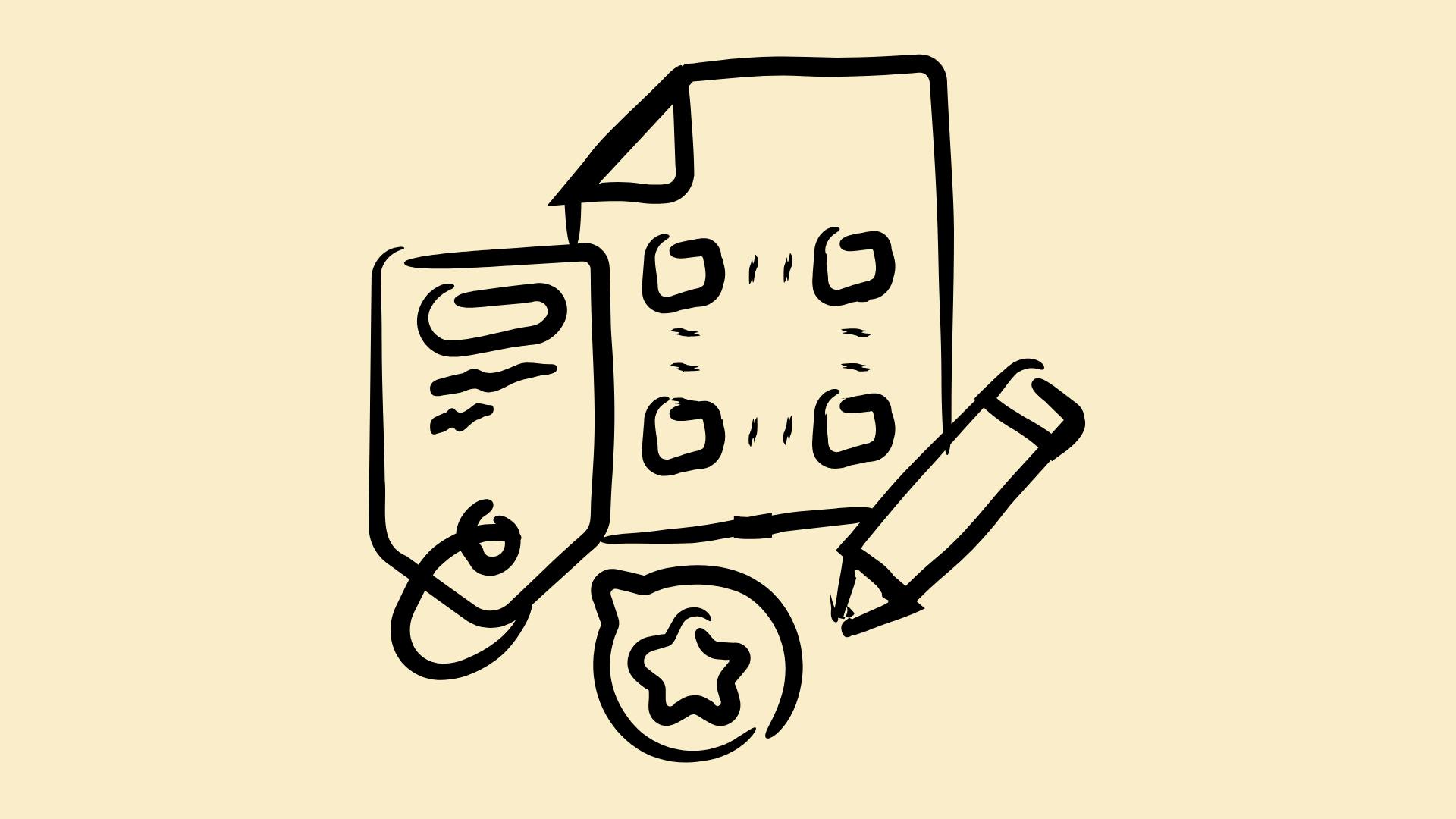AI progress notes are changing how therapists manage documentation. Instead of spending hours after sessions, you can now generate structured, HIPAA-compliant notes in just minutes.
These tools listen to your sessions, identify key clinical details, and format them into usable progress notes—helping you save time, reduce burnout, and stay focused on client care.
In this guide, you’ll find the top 8 AI progress note tools built for mental health. We break down pricing, security, and integration options to help you choose the right fit for your workflow.
What Are AI Progress Notes and How Do They Work?
AI progress notes use AI to turn your session conversations into clear, structured clinical documentation. These note generator tools listen to your sessions and create professional-quality notes—automatically.
The Technology Behind AI Documentation
AI progress notes rely on speech-to-text transcription to turn your spoken words into written text. Then, natural language processing analyzes the content to pull out clinically important details—like symptoms, interventions, and client responses.
The system maps that info into structured note templates, whether you use SOAP notes, DAP notes, or a narrative format. Most platforms meet HIPAA compliant standards with encrypted data sharing and secure database storage—but always check a tool’s exact privacy policies.
Key Benefits for Mental Health Professionals
The biggest win? Huge time savings with your documentation. What used to take 15–30 minutes per note now takes under 5. You’ll get your session notes done faster—and with less stress.
AI generated notes also stay consistent by using proven note templates. Your progress notes are more complete and professionally written.
But maybe the best part? More balance. Less time on paperwork means more free time for client care, learning, or just recharging. Many therapists say they feel less burnout when admin work becomes easier.
These tools take the pressure off note writing so you can focus on what really matters—supporting your clients and your practice.
The Top 8 AI Progress Notes Tools Mental Health Professionals Actually Use
You know that feeling when you finish a great session with a client, but then remember you have 20 minutes of documentation ahead? Let's fix that. AI progress notes tools are a game changer for mental health professionals who want to spend less time on documentation and more time being fully present with clients.
We've tested every major progress note generator on the market. Here's what actually matters when you're choosing an AI powered tool for your practice.
Supanote – The One That Actually Talks to Your EHR
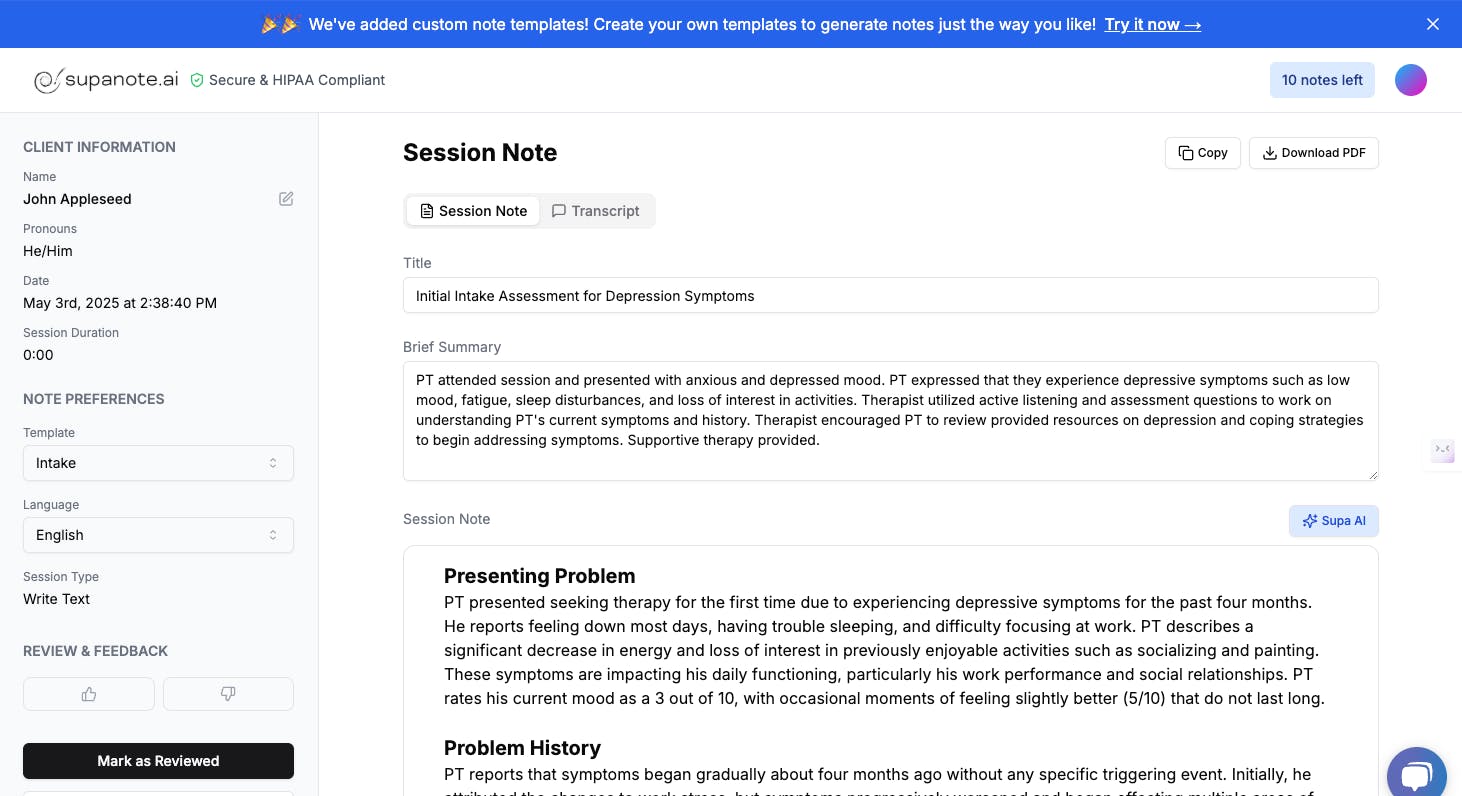
Supanote gets it. Built specifically for mental health, it's the only AI note generator with native EHR integration that actually saves time. No more copy-paste marathons.
What makes it different:
- Super Fill button pushes notes directly into your EHR (game changer for efficiency)
- Customizable note templates that match how you actually write
- Real humans answer support tickets (not bots)
- Works for in person sessions and telehealth equally well
- Handles SOAP notes, DAP notes, and other formats you need
Pricing: Basic plan starts at $19.99/month billed annually (40 notes). Professional at $39.99/month billed annually (100 notes). Premium unlimited notes at $69.99/month billed annually. Free plan upto 10 notes, no credit card required upfront.
Best for: Therapists who hate switching between systems and want seamless documentation.
Mentalyc
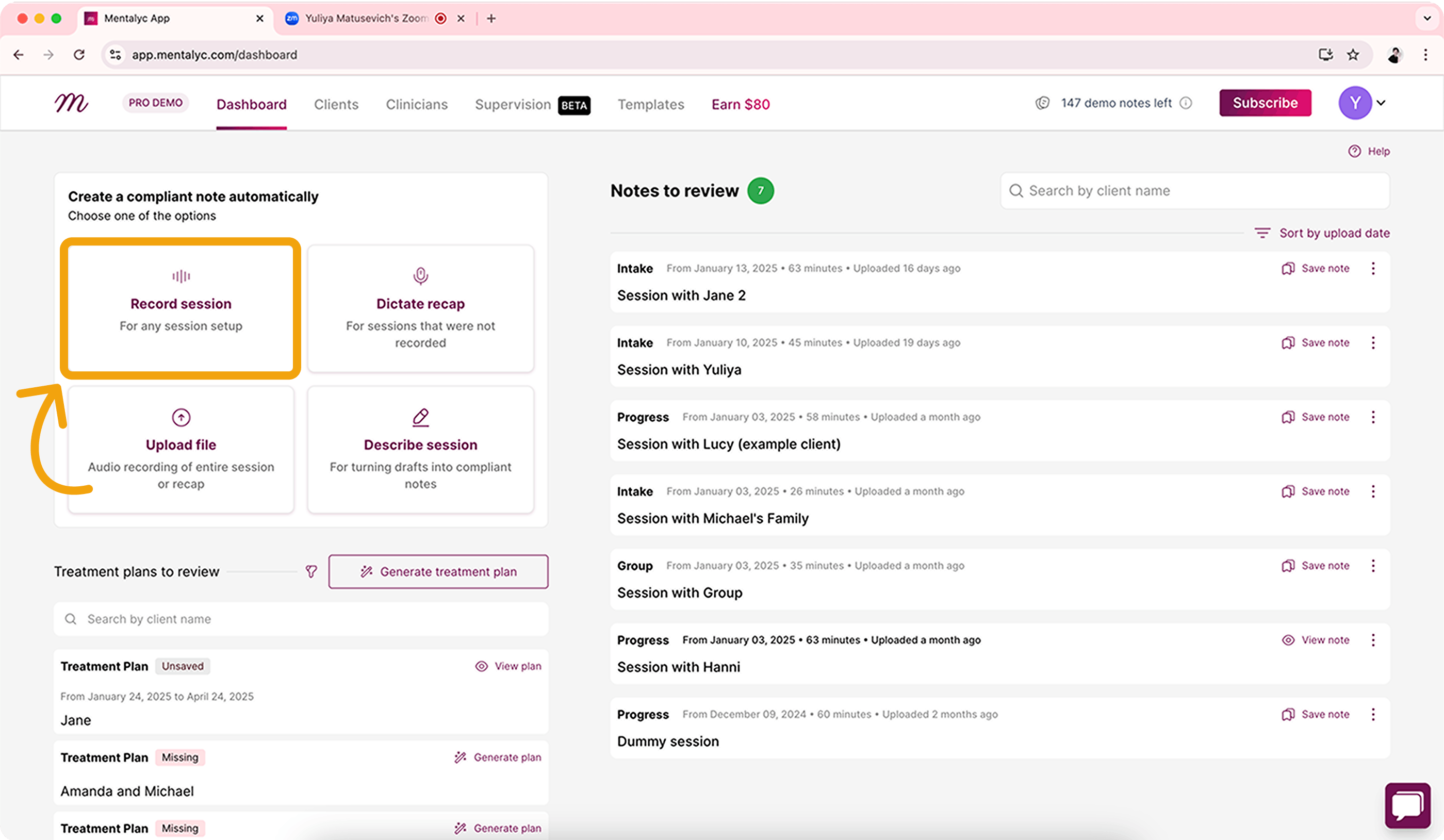
Mentalyc has built strong brand recognition in the therapy community through consistent focus on mental health documentation needs. The platform offers structured progress notes that align with common therapeutic frameworks.
Standout features:
- SOAP, DAP, BIRP formats built for mental health documentation
- Team discounts that make sense for group practices
- Copy-paste workflow (not ideal, but works with any EHR)
- Active user community sharing tips
- Consistent note formats across all your therapy sessions
Pricing: Mini at $19.99/month (40 progress notes), Professional at $39.99/month (100 notes), Premium unlimited notes at $69.99/month. 7-day trial available.
Best for: Established private practice needing proven note templates.
Upheal
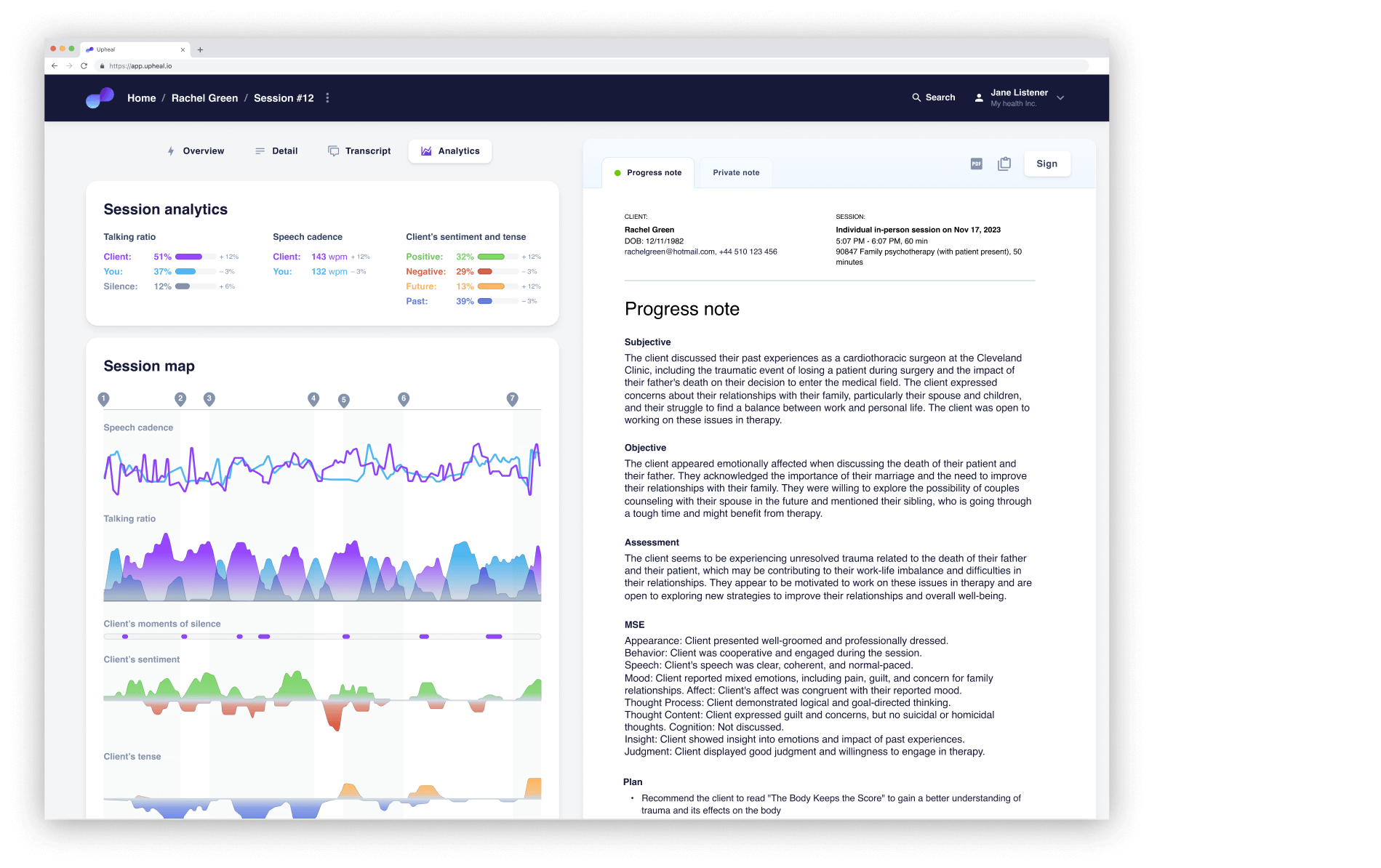
Upheal differentiates itself by offering monthly unlimited notes at no cost, making it accessible for new mental health professionals or those with budget constraints. Recent funding has accelerated feature development and platform capabilities for therapy notes generation.
Key features:
- Free notes tier with unlimited basic documentation
- Built-in telehealth (one less subscription to manage)
- Session summary insights beyond standard notes
- AI powered note taking that improves with use
- 14-day premium trial without credit card required
Pricing: Free tier (unlimited notes), Plus at $19/month, Premium at $35/month, Pro at $69/month.
Best for: New therapists or anyone wanting to test AI options without commitment.
Blueprint
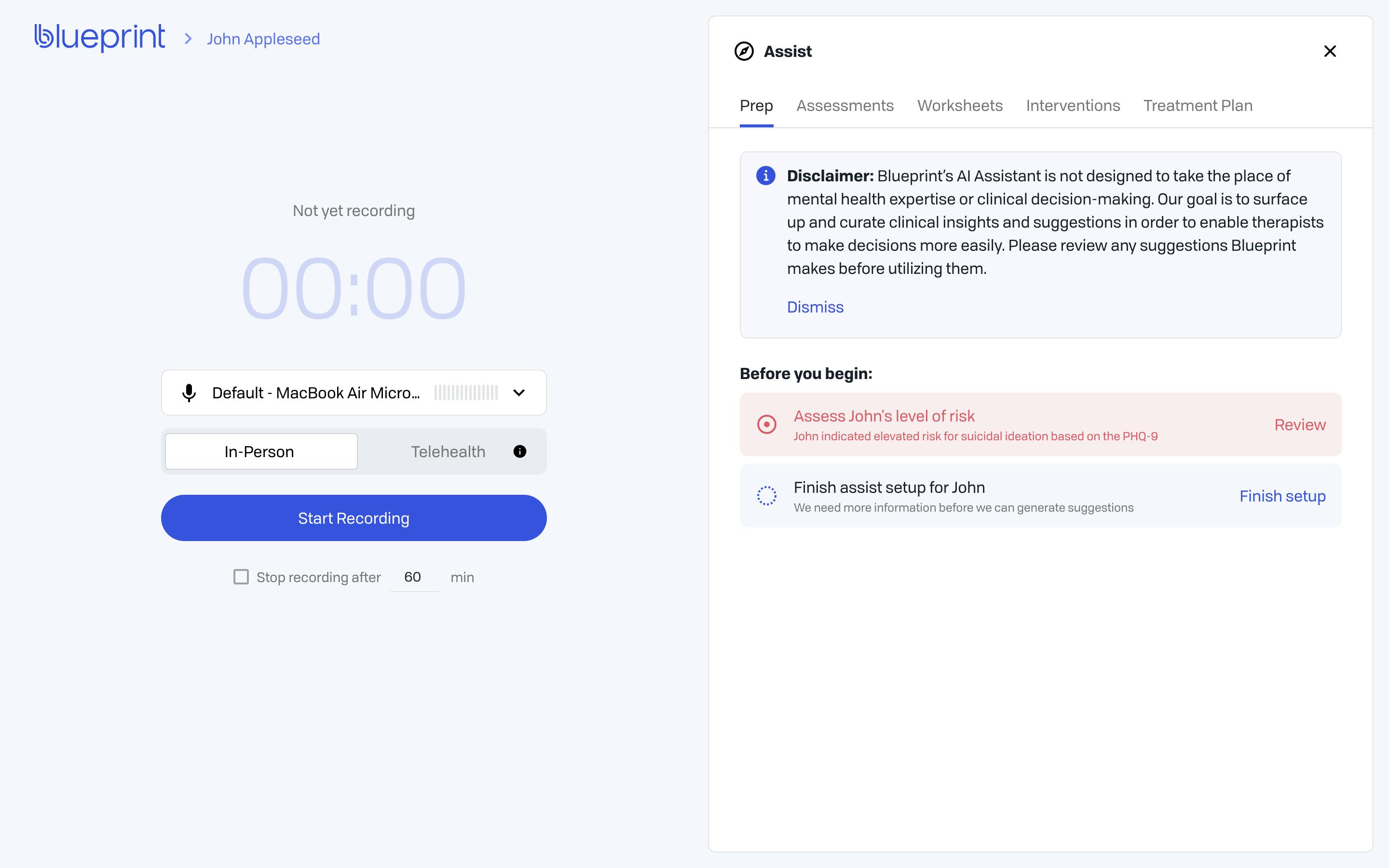
Blueprint has gained traction as a newer entrant focusing heavily on session recordings quality and transcription accuracy. The platform’s auto-upgrade system adapts to user needs automatically for writing notes efficiently.
Notable features:
- Pricing scales with your actual session volume
- High-quality session recordings and transcription
- Blueprint 2.0 brings enhanced AI generated accuracy
- Regular promotions (often 50% off first months)
- Strong focus on recording sessions quality
Pricing: Starting at $29/month with frequent deals. Auto-upgrade based on usage.
Best for: Mental health professionals with fluctuating caseloads.
Freed.ai
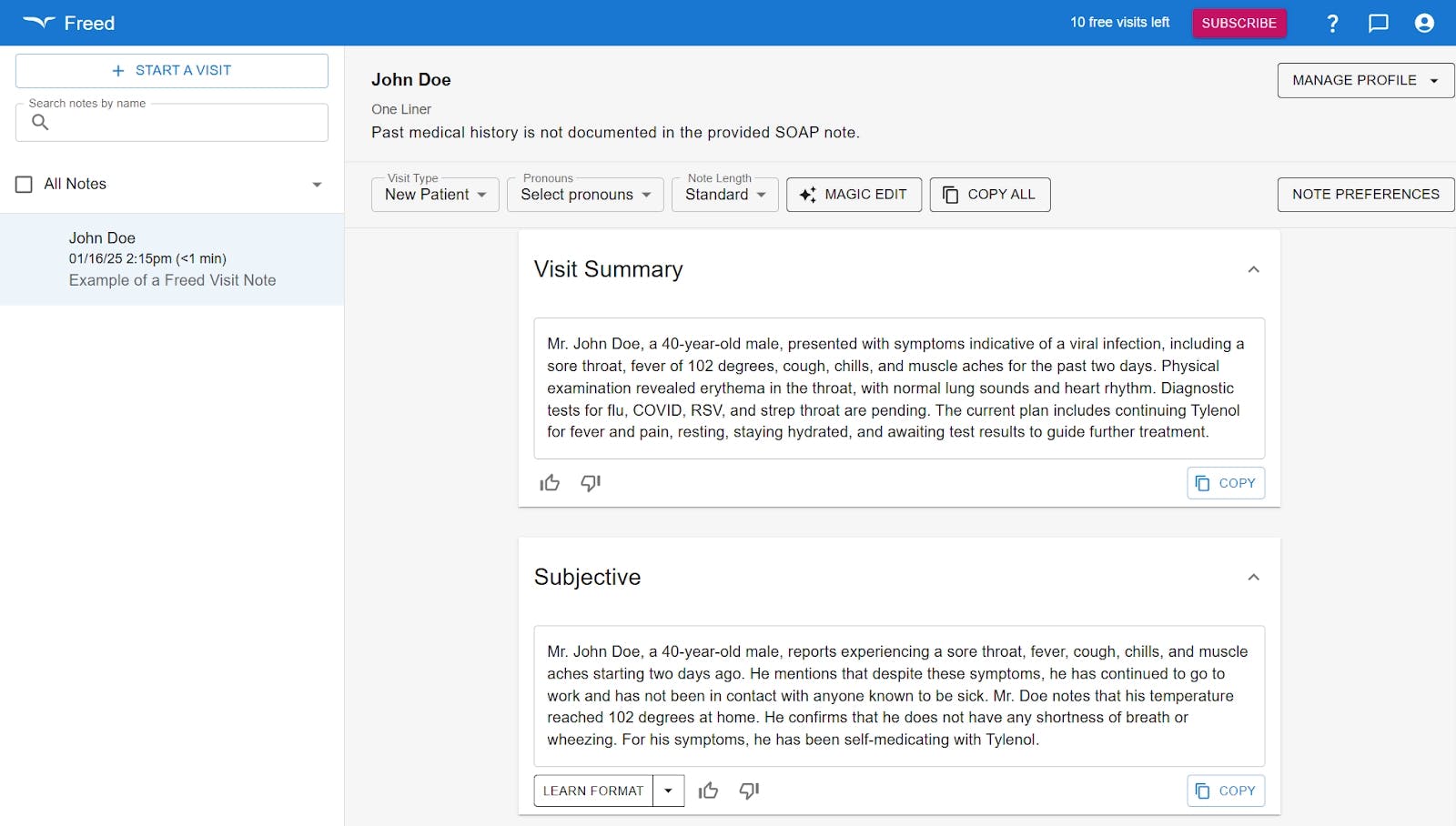
Freed.ai brings medical-grade accuracy claims and cross-specialty support to mental health documentation. The platform’s flat-rate pricing model provides predictable costs for high-volume users generating notes daily.
Highlights:
- $99/month for truly unlimited notes
- Cross-specialty support (great for integrated care)
- Group practices get reduced rates
- 10 free notes to test thoroughly
- Medical-grade accuracy claims
Pricing: $99/month unlimited. Group practices pay $84/month per user (2-9 users).
Best for: High-volume practices or integrated healthcare settings.
Yung Sidekick
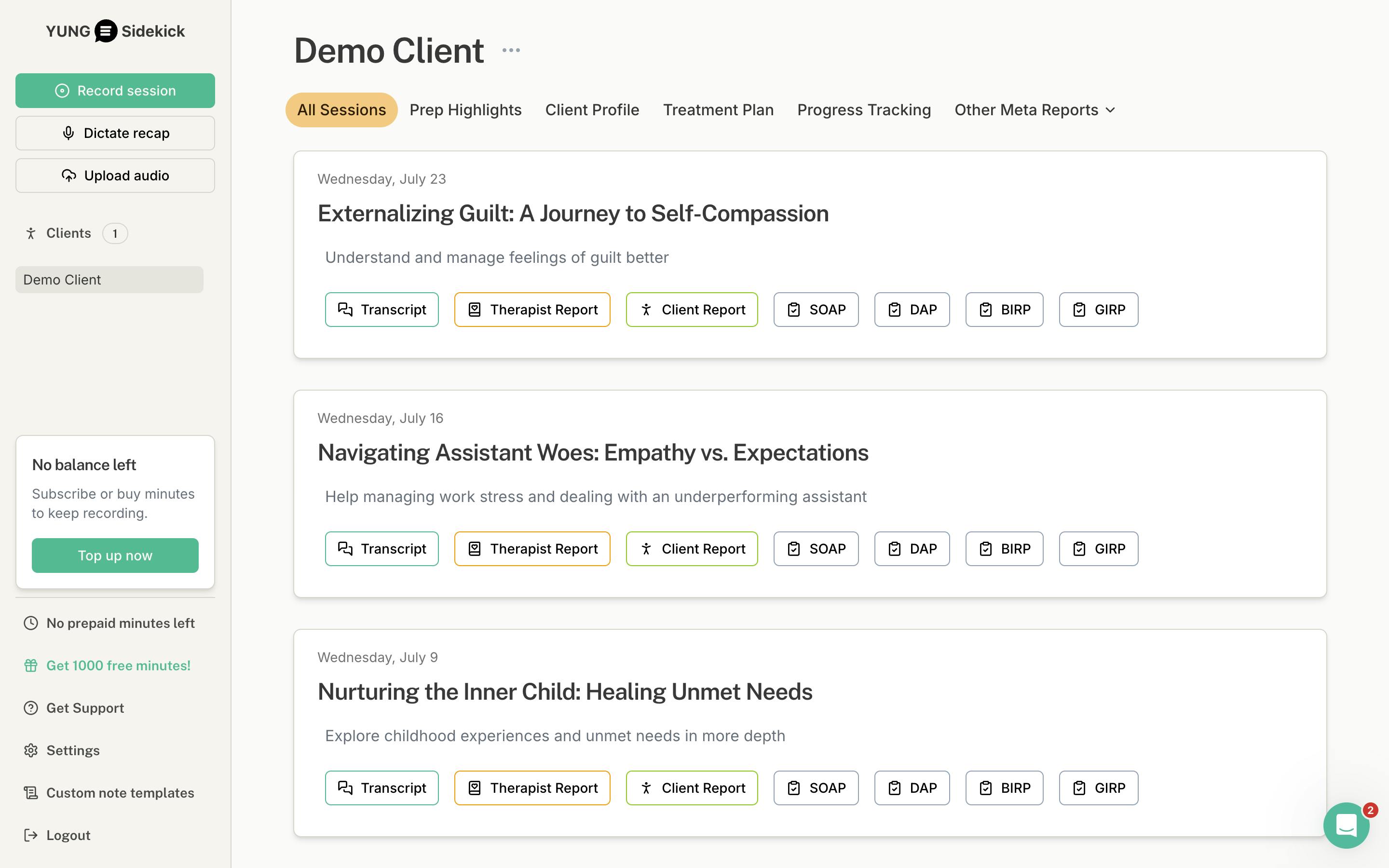
Yung Sidekick operates on a tiered session-limit model with transparent overage pricing for progress note based workflows. The platform focuses exclusively on mental health with flexible capacity options.
Features:
- 130-400 monthly session tiers
- Mental health specific workflows
- Transparent overage pricing ($0.03/minute)
- Progress note based pricing aligns with practice volume
- 7-day trial period
Pricing: Starter $39.99/month (130 sessions), Professional $59.99/month (250 sessions), Premium $99.99/month (400 sessions).
Best for: Solo practitioners with predictable session counts.
Quill Therapy Notes
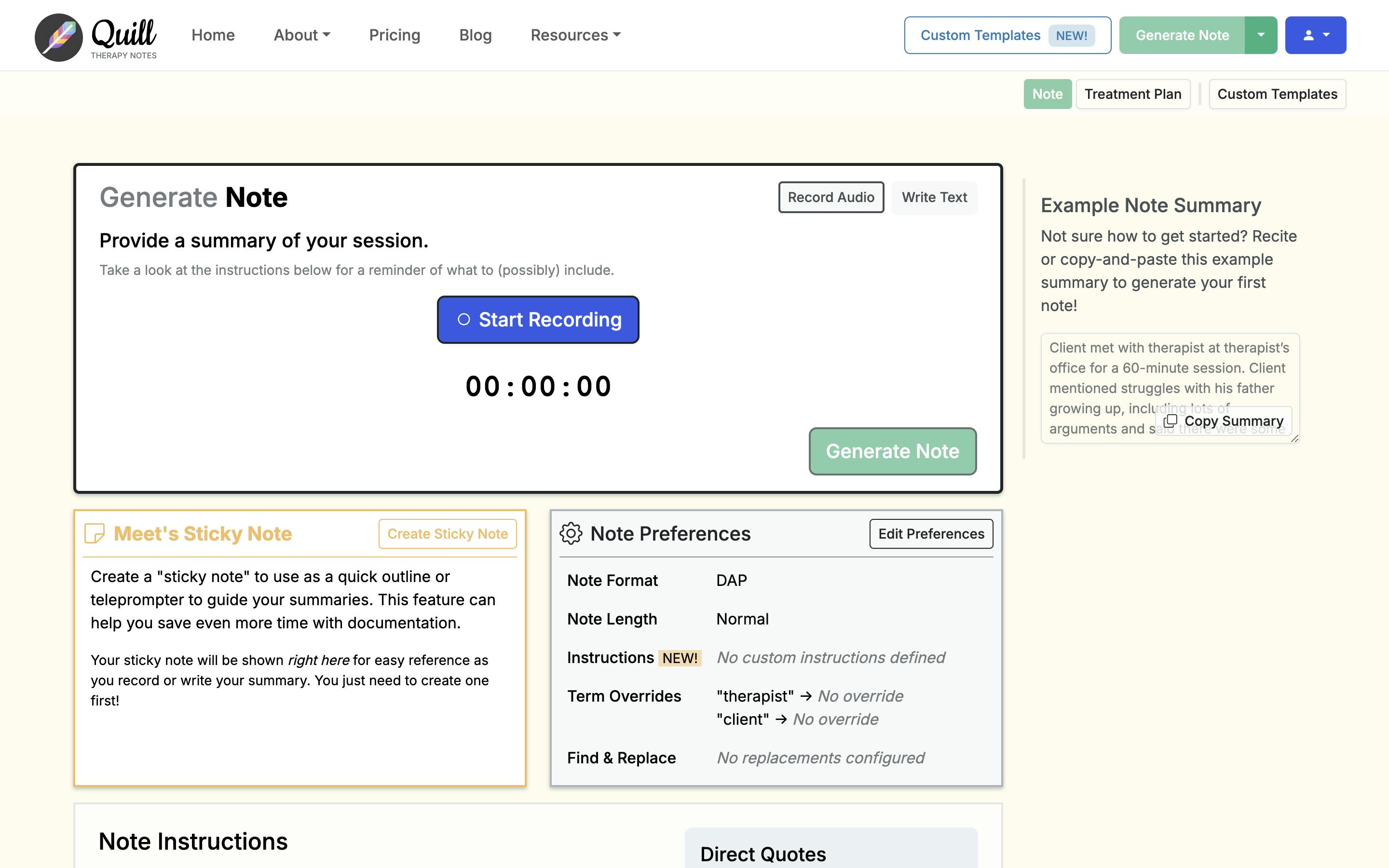
Quill Therapy Notes takes a unique approach by focusing on brief summary documentation without requiring session recordings. This addresses privacy concerns while maintaining documentation efficiency for note writing tasks.
Advantages:
- No recording sessions needed (addresses consent form concerns)
- Brief summary input saves time
- Monthly unlimited notes at competitive rates
- Team pricing supports group practices
- 14-day free trial
Pricing: Individual $20/month (unlimited notes), Teams $16/month per user.
Best for: Therapists prioritizing client privacy or working with recording-sensitive populations.
Autonotes
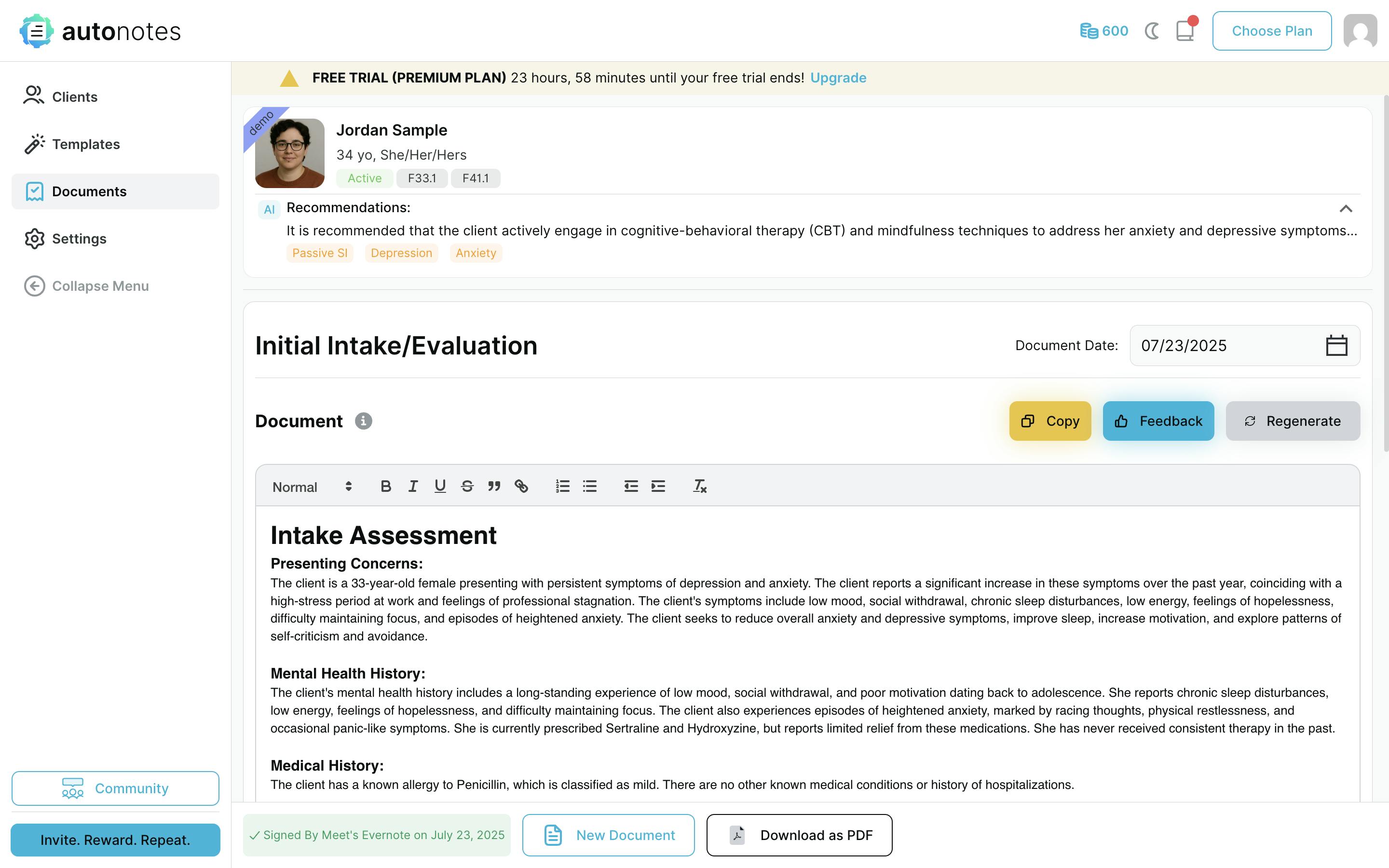
Autonotes serves a broad healthcare audience with over 65,000 users across multiple specialties. The credit-based system provides flexibility while maintaining strong security features for client data protection.
Enterprise features:
- Credit-based flexible usage
- PHI de-identification for extra data privacy
- Robust security for client data protection
- Multi-specialty platform stability
- 24-hour unlimited trial
Pricing: Starter $25/month, Professional $55/month, Premium $99/month.
Best for: Larger practices needing enterprise-grade security.
AI Progress Notes Tools Comparison
Here’s a comprehensive comparison of the top 8 AI progress notes tools specifically designed for mental health professionals:
Tool | Starting Price | Best Feature |
|---|---|---|
Supanote | $19.99/mo annually (Free plan available) | Built for mental health, native EHR autofill |
Mentalyc | $19.99/month | SOAP/DAP templates with team discounts |
Upheal | Free (unlimited basic notes) | Permanent free tier with built-in telehealth |
Blueprint | $29/month | Session-based pricing with auto-upgrade |
Freed.ai | $99/month | Unlimited notes across all medical specialties |
Yung Sidekick | $39.99/month | Tiered session limits with overage pricing |
Quill Therapy Notes | $20/month | No session recording required |
Autonotes | $25/month | Multi-specialty platform with 65K+ users |
This comparison highlights the diverse pricing models and unique strengths of each platform, helping you choose the tool that best matches your practice needs and workflow preferences.
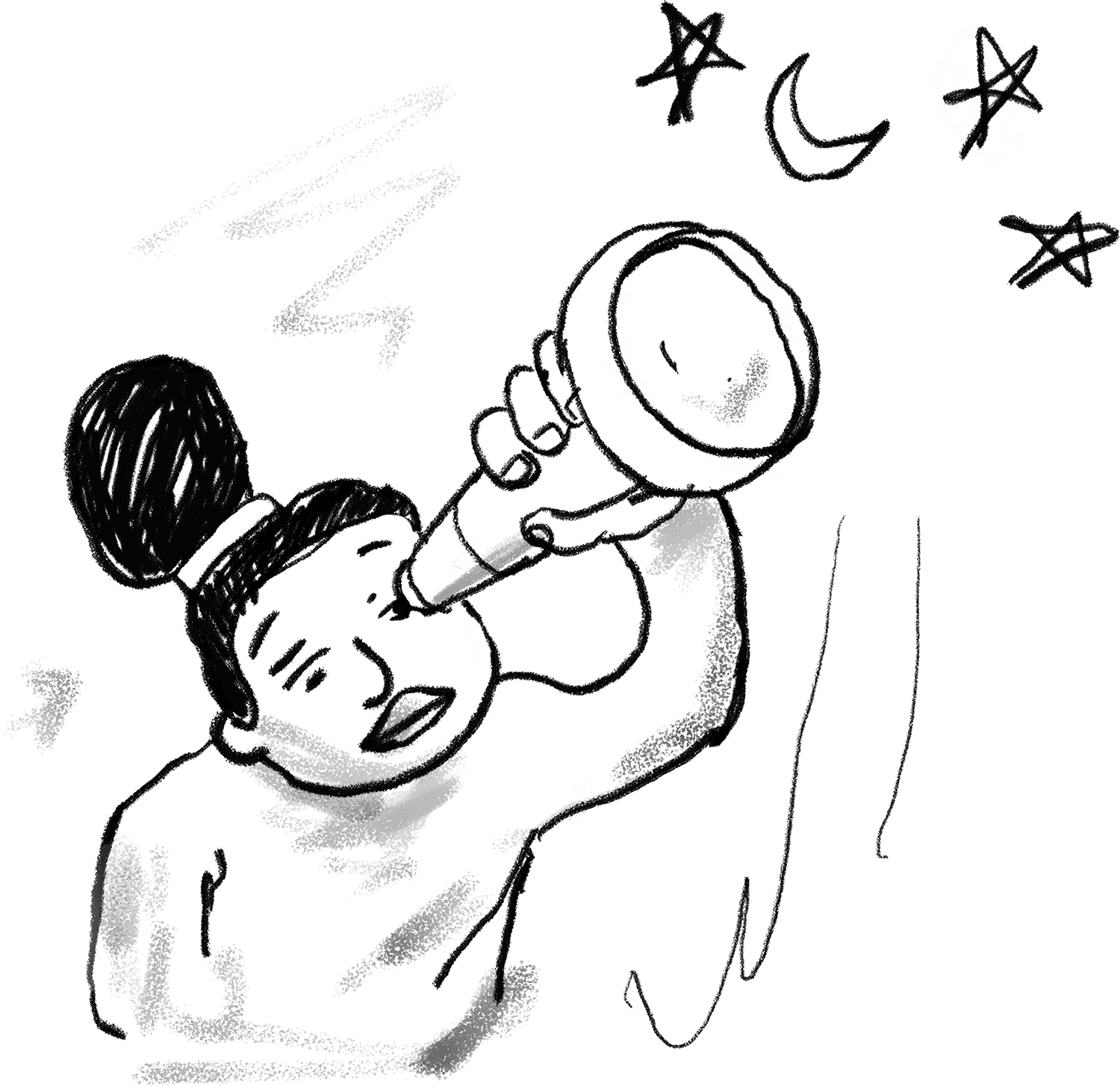
Key Factors to Consider When Choosing
Selecting the right AI progress notes tool requires evaluating how each platform fits your specific practice workflow and budget constraints.
Integration and Workflow
EHR compatibility should be your first consideration. Native integrations like Supanote’s Super Fill button streamline your workflow more than copy-paste solutions for progress notes.
- Setup complexity varies significantly - some tools require minimal configuration while others need extensive customization
- Mobile access ensures you can document session notes from any device
- Cross-device functionality maintains consistency whether you’re using desktop or tablet for therapy notes
Pricing and Value
Pricing models differ dramatically across AI progress notes platforms. Per-note pricing (like Supanote at $19.99 for 40 notes) works well for part-time practitioners, while unlimited notes plans (Freed.ai at $99/month) benefit high-volume practice needs.
- Free trial periods range from 7 days (Yung Sidekick) to 14 days (Supanote)
- Money-back guarantees provide additional protection for your investment in AI generated documentation
- Team discounts can significantly reduce per-user costs - Quill offers $16/month per user for teams versus $20 individual pricing for group practices
Consider your monthly session volume, EHR requirements, and team size when comparing ai note generator options. The cheapest tool isn’t always the most cost-effective if it doesn’t integrate smoothly with your existing workflow for clinical documentation.
Frequently Asked Questions
Q: Are AI progress notes HIPAA compliant?
A: Most reputable progress note generator tools are hipaa compliant and include Business Associate Agreements (BAAs). Always verify compliance and request a signed BAA before using any AI documentation tool for client data protection.
Check that the platform uses encrypted data transmission and secure database storage for your client information.
Q: Can AI tools replace my clinical judgment in documentation?
A: No, AI note generator tools assist with documentation structure and formatting but cannot replace your clinical expertise. You must review and edit all AI generated notes to ensure accuracy and clinical appropriateness for treatment plans.
These tools save time on administrative tasks while you maintain full control over clinical content and client progress assessments.
Q: Do I need to record entire therapy sessions for AI notes?
A: Most AI tools require session recordings to generate structured progress notes, but some work with brief summary inputs instead. Always obtain explicit client consent form signatures before recording sessions for data privacy compliance.
Some platforms like Quill Therapy Notes don’t require recordings and work from written summaries you provide after therapy sessions.
Q: How accurate are AI-generated progress notes?
A: AI accuracy varies by platform and typically ranges from 85-95% for transcription of session recordings. Clinical note quality depends on your recording clarity and the tool’s mental health training with ai models.
Always review and edit notes generated before submitting to ensure clinical accuracy and completeness for insurance requirements.
Q: Will AI progress notes integrate with my current EHR system?
A: Integration varies significantly between ai powered platforms. Some offer native EHR integration with direct note uploading, while others require copy-paste workflows for therapy notes transfer.
Check compatibility with your specific EHR system before choosing a tool, as seamless integration greatly improves efficiency and time spent on documentation.
Q: What happens if the AI tool misinterprets sensitive clinical information?
A: Always review AI generated notes thoroughly before finalizing them in client records. Most platforms allow easy editing and corrections within their interface for progress note based adjustments.
Establish a consistent review process to catch any misinterpretations or missing critical information before documentation submission to maintain hipaa compliant standards.
Q: Are there free notes options available?
A: Yes, several platforms offer free notes with limitations. Upheal provides monthly unlimited notes on their basic plan, while others offer free trials ranging from 7-14 days without credit card required.
Free plans typically have feature restrictions or note quantity limits compared to paid versions with unlimited notes access.
Q: How long does it take to generate an AI progress note?
A: Most progress note generator tools create initial notes within 2-5 minutes after uploading a session recording. Processing time depends on session length and platform efficiency with ai models.
Factor in additional time spent for your review and editing process before the note is ready for your EHR system and treatment plans updates.
Factor in additional time spent for your review and editing process before the note is ready for your EHR system and treatment plans updates.
Q: Can I customize AI note templates for different therapy modalities?
A: Many AI progress notes platforms offer customizable note templates for various therapy approaches like CBT, DBT, or EMDR. Look for progress note generator tools that allow template personalization to match your preferred documentation style and theoretical orientation.
This customization improves note relevance and reduces editing time. Structured progress notes templates help maintain consistency across all your therapy sessions while meeting insurance requirements for your private practice.
Conclusion
AI progress notes can save you hours—if you choose the right tool. Start by checking how well it fits your workflow. Look for support for your preferred note format (SOAP, DAP, etc.), EHR integration, and how many sessions you run each week.
Most tools offer a 7–14 day free trial. Use that time to test how well the notes match your clinical voice and whether they actually reduce your admin load.
Pick a tool you’ll stick with. Prioritize ease of use, accurate output, and long-term value. Many therapists find that unlimited notes plans work best for busy caseloads.

